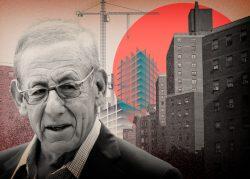Democratic candidates for state office seized the final 24 hours before the primary election to align themselves with a political zeitgeist — tenant protections against landlords.
Gov. Kathy Hochul’s challengers took the opportunity to set themselves apart from the incumbent by portraying themselves as candidates for the people and not the property owners.
Rep. Tom Suozzi, a Long Island centrist and Hochul’s closest competitor, appeared outside NYCHA’s downtown Manhattan headquarters Monday afternoon to bemoan the state of the public housing stock, criticize a Hochul-approved plan to reform it and back tenant cries to stave off privatization.
Hours earlier, Assembly member Mathylde Frontus, seeking re-election in Coney Island, had rallied against an example of that blight at NYCHA’s O’Dwyer Gardens complex. Flanked by tenants, Frontus demanded gas service be restored at the long-underserviced property.
And the day began with a 9 a.m. protest at Central Brooklyn’s Flatbush Gardens apartments where Public Advocate Jumaane Williams, another Hochul challenger, joined a spokesperson for state Sen. Kevin Parker — also gunning for another term — to decry dismal living conditions that he blamed on Clipper Equity.
In a city where two-thirds of the constituency rents, the candidates’ events represented an 11th–hour attempt to attract votes from the city’s large pool of Democratic voters.
Their strategy? Affirm the issues that tenant advocates have elevated to Defcon 1 in recent months.
Market-rate tenants who struggled to pay throughout the pandemic have seen rents soar by as much as 40 percent. Meanwhile, stabilized renters’ increase was set at 3.25 percent for one-year leases renewed on or after Oct. 1, a hike their advocates deemed unaffordable. It was their highest increase since 2013.
And scores of NYCHA tenants are fed up with waiting for the city to repair the long-beleaguered public housing stock, although one rescue plan is well under way and another was enacted this month.
At the Flatbush Gardens rally, residents of the largely rent-stabilized apartment complex described the irony of paying more and getting less.
“Rents just went up 3.25 percent to 5 percent for a two-year lease. Salaries are not going up; services are going down,” a member of the Flatbush Gardens Tenant Association said.
Flatbush Council member Farah Louis broadcast the tenants’ complaints through a megaphone: collapsing ceilings, mold-covered walls, rats in the hallways.
“We have a management team that wouldn’t even go to the discount store and buy Fabuloso so our buildings don’t stink,” the tenant member added, referring to the budget cleaner.
Williams stepped in midway through the conference to float solutions and tout his track record of advocacy.
“The first building I ever organized as a tenant advocate was this building right here,” Williams said. “I am so upset that decades later, we’ve got a new name but some of the same problems.”
Read more


Williams said he had called David Bistricer, CEO of the building’s management company Clipper Equity that morning, but had not heard back. Clipper Equity also did not return The Real Deal’s request for comment.
“We better hear back from him or we should probably organize folks to not pay their rent anymore until we get the repairs needed,” Williams announced to applause.
Williams, the most progressive of the three Democratic candidates for governor, built his campaign in part on insulating tenants from “predatory landlords” by pushing policies such as good cause eviction. The legislation failed to pass in Albany last session.
For most of 2022, Hochul stayed silent on the bill, toeing the line between renters and the real estate industry, a group that has padded her campaign with millions of dollars.
But approaching primary day with a comfortable lead in the polls, the governor has become more vocal, telling the New York Times that she does not support good cause eviction because she’s “very concerned about the small landlord.” She also promised attendees of the Real Estate Board of New York gala that she would help the industry.
Williams’ appearance beside tenants Monday was a final attempt to distinguish himself as Hochul’s antithesis.
Suozzi took a more direct approach. He used his mic time Monday to take a swing at a bill Hochul signed this month to fund some of the estimated $40 billion in repairs needed across NYCHA’s 172,000 apartments.
The legislation created the New York City Public Housing Preservation Trust, a means to tap Section 8 subsidies — a more reliable, abundant source of federal capital than NYCHA’s usual Section 9. The trust could issue bonds, borrowing against the Section 8 revenue stream, to potentially cover billions in repairs.
Some NYCHA tenants, however, have bristled at any plan that allows a third party to invest in public housing. After Hochul created the trust, a group of residents wrote in a City Limits op-ed that the bill had faced “fierce and steadfast resident opposition” because the program relied on “debt-financing mechanisms for repairs that would prioritize creditors and debt service over residents and community needs.”
Similarly, residents protested the Rental Assistance Demonstration or RAD program, which handed over the management of select NYCHA properties to private developers, arguing that the Obama administration program pads firms’ pockets and includes little incentive to perform repairs. But others have called it a tremendous success, and the city has scaled it up.
Suozzi has aligned himself with the dissenters, backing groups such as Save Section 9 that are committed to keep private interests out of NYCHA.
“The NYCHA residents do not support that legislation and it shouldn’t have been passed without their input,” said Suozzi, rebutting Hochul’s praise for the program in a June 16 debate.
However, Suozzi has not outlined an alternative to funding NYCHA. A spokesperson for Suozzi’s campaign did not respond to a request for comment.
A deeper look at Suozzi’s housing positions shows he is far more industry-friendly than one might guess from his Monday event.
In the same June 16 debate, Suozzi dodged a question on how he would “help people struggling with high rent,” instead emphasizing needed NYCHA reforms and criticizing the governor’s spending.
The Long Islander has also been candid about the need to roll back some provisions of the pro-tenant rent law of 2019.
“I think it’s not working,” Suozzi said in an interview with The Real Deal, elaborating that landlords need a way to bring the city’s 42,000 vacant stabilized units back online. Allowing owners to reset rents on vacant units, as the landlord group the Community Housing Improvement Program has suggested, would be one solution.
In the same interview, Suozzi said that he “absolutely” did not back good cause eviction, a policy that would offer tenants protection in housing court should their rent be raised by 3 percent or 1.5 times the inflation rate, whichever is higher.
“I am concerned when I hear the stories about people’s rents going up 50 percent, 100 percent or more in a short period of time and we have to figure out what we can do by using market principles,” Suozzi said. “But I’m concerned this good cause eviction will result in more problems.”
But regardless of whether the Monday rallies were vote grabs or demonstrations of true support, they likely won’t make much difference in the outcome. As of last week, Hochul led Williams and Suozzi by more 30 points.
Tenants’ cries may be loud, but in this race, real estate’s money speaks louder.
